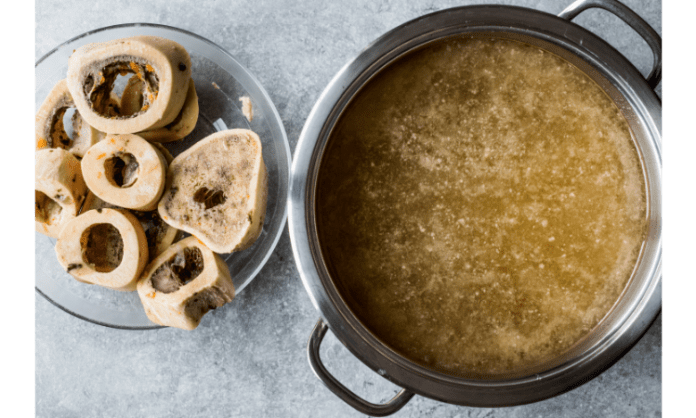
Bone broth is a liquid that’s made from simmering animal bones, meat, and vegetables. It has been a traditional food source for many cultures around the world, including those of Asia and Europe. Bone broth has been used as medicine for thousands of years by different cultures throughout history. It’s believed that bone broth can benefits everything from improving skin health to digestion issues and even immune system problems. Let’s have a true idea of bone broth, its benefits, and side effects if any.
What is Bone broth?

Bone broth is a nutrient-rich liquid that is made from the bones of animals and fish. It has been used for thousands of years as a traditional food, with its popularity stemming from the many health benefits it offers. Bone broth contains gelatin which is beneficial to digestion and skin health, while also providing an excellent source of collagen — an important component of skin that helps maintain elasticity.
What is the nutritional value of bone broth?
Bone broths are rich in minerals and amino acids, and contain collagen. It also has benefits of anti-inflammatory properties. The nutritional value of bone broth depends on the animal from which it was made—for example, beef bone broth contains more protein than chicken bone broth.
The list below shows some of the vitamins, minerals, amino acids, and other nutrients contained in broths:
- Amino Acids: glycine, arginine, proline, and glutamine (found in abundance)
- Calcium
- Chondroitin Sulfate
- Collagen (found abundantly)
- Glucosamine (a building block for cartilage)
- * Glutamine (an important fuel source for the cells of your digestive tract) * Glycine (an important fuel source for cells throughout your body)
How to make it?

- Use bones from pasture-raised animals. You can use beef and lamb bones, but using chicken and turkey bones is best. The fats in the meat will help create a richer broth, while the mineral content of the bones will provide your broth with nutrients and flavor. If you aren’t able to find pasture-raised animals, try using organic meats as much as possible—the more natural these products are, the better.
- Make sure that you’re using grass-fed animals’ bones when making broth at home. This type of animal has been raised on an entirely vegetarian diet (grass) while being able to roam freely around open spaces or fields; this gives them access to sunlight so they can synthesize vitamin D naturally in their bodies (which is important for bone health). Grass-fed cows also have higher levels of omega-3 fatty acids than grain-fed cows, which may help reduce inflammation in joints throughout your body (including those where arthritis pain tends to flare up).
How Much Bone Broth Should You Drink Daily?
In addition to being a great source of nutrition and hydration, bone broths can also be used as an effective tool for weight loss. In fact, it has been shown that drinking 2 cups of bone broth a day could help you lose up to 3 pounds in one week.
To take advantage of this powerful effect, make sure your body is getting the nutrients it needs by incorporating bone broth into your daily meal plan. You should drink 1-2 cups of bone broth per day and add it to soups or other dishes so you’re not just drinking straight-up liquid.
How to use bone broth?

- Use it to make soups, stews, and sauces. Bone broth is a great way to add additional body, nutrition, and flavor to soups and stews. You can also use bone broth as a base for other dishes (e.g., risotto or pilaf).
- Use it in gravy. When making your own gravy from scratch, use bone broth instead of water for extra flavor.
- Make bone broth ice cream with just three ingredients: 1/2 cup grass-fed butter (or ghee), 3/4 cup coconut milk or heavy cream, and 2 cups homemade chicken stock or beef stock – this recipe makes about five servings worth of ice cream. You can also add your favorite mix-ins like berries before freezing for extra sweetness.
Health benefits of Bone broth
Improve skin health

As you age, your skin loses its elasticity and can become less hydrated, leading to wrinkles and sagging. Bone broth helps improve this by supplying the nutrients necessary to keep your skin healthy. Specifically, bone broth contains collagen which is a key protein in keeping your skin firm and plump. The high levels of calcium also help with the process of removing dead or damaged cells on the surface of your skin while also helping boost cellular regeneration.
The anti-inflammatory properties found in both chicken and beef bone broths are also beneficial for reducing redness or inflammation in the body as well as soothing any rashes or eczema flare-ups caused by dryness or irritation due to weather changes or other irritants such as cosmetics that may be causing trouble areas on your face (or anywhere else).
Improve joint health

Bone broths are a rich source of glucosamine and chondroitin sulfate, which are compounds that play an important role in healthy joint function. Collagen is also beneficial for cartilage, tendons, ligaments, and other tissues throughout the body. Proline is another compound found in bone broth that has been shown to help with joint pain. It works by reducing inflammation and increasing collagen synthesis—the process by which cells create new materials like bone tissue (animal studies have linked proline’s anti-inflammatory properties to its ability to reduce symptoms of arthritis).
Other research suggests that non-essential amino acids like glycine may help improve sleep quality by lowering cortisol levels at night: Cortisol helps regulate stress responses but can cause insomnia when it’s released too often or at inappropriate times (like waking someone up during their REM cycle).
Helps in digestion

Bone broth is rich in collagen and gelatin, which help to heal the gut lining. This can improve digestion and help relieve symptoms of digestive disorders like IBS or Crohn’s disease.
In addition to its benefits for the digestive system, bone broth is also an excellent source of proline, a non-essential amino acid that has been shown to reduce joint pain.
Improve sleep quality

If you want to improve your sleep quality and get the most out of a night’s rest, bone broth can help. Bone broth contains tryptophan, an essential amino acid that helps with sleep regulation—and it’s also rich in glycine, which slows down digestion and promotes relaxation by activating the parasympathetic nervous system (the part of our nervous system responsible for rest and relaxation).
It also contains calcium and magnesium—two minerals that have been shown to aid in bettering sleep quality. Calcium keeps nerves from firing too frequently or erratically while magnesium helps muscles relax. These two minerals are important components of healthy bones as well but they have other functions as well including regulating hormones like melatonin while also helping nerve cells communicate with one another efficiently.
Improve immune system

Bone broth is rich in minerals and amino acids, which are integral to the immune system. If you’re feeling a bit under the weather or just want to prevent sickness, it’s important to keep up your nutrient intake by consuming bone broth regularly. Bone broth has been shown to help fight colds and infections because of its ability to boost your immune system.
Good for gut health

The gut is one of the largest organs in the body and an important part of our immune system. It’s where all of the good stuff (and some bad stuff) gets absorbed into your bloodstream, so it’s definitely worth taking care of. If you’re looking for a simple but effective way to support gut health, bone broth may be just what you need.
Bone broth is high in collagen and gelatin—two proteins that help boost the immune system, strengthen bones, and aid digestion by increasing digestive enzymes while supporting intestinal health.
That’s because these proteins both contain glycine—an amino acid that helps lower inflammation as well as improve sleep quality—plus proline, which can aid brain function when taken regularly over time by reducing oxidative stress within neurons (the cells in our brains).
Side effects of Bone broth

Bone broth is a natural way to improve your health and well-being. It’s rich in nutrients that can help you feel better, such as minerals and collagen. However, there are some side effects you should know about before you start drinking it.
First of all, don’t overdo it with bone broth! It’s rich in nutrients so it can be easy to consume too much of it at once. You may get heartburn or indigestion if you drink too much at once or too quickly. It’s best to sip on bone broth throughout the day instead of drinking large quantities at one time.
To have zero side effects it’s also important to make sure your bones are from healthy animals that were raised humanely (and preferably locally). This will ensure that your bones haven’t been contaminated by chemicals used on factory farms or in slaughterhouses.
Conclusion
Bone broth is one of the most effective home remedies for a variety of health conditions. It has been used as an efficient source of nutrients, minerals, and amino acids since time immemorial. In recent years, bone broth has gained popularity due to its numerous health benefits and healing properties which include joint relief, weight loss, and even disease prevention.











